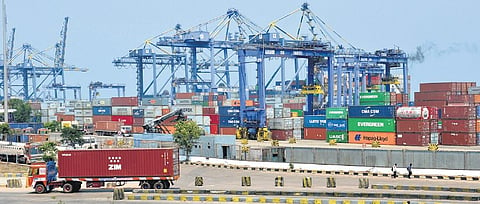

At a recent event, Finance Minister Nirmala Sitharaman asked why business leaders were not investing in India. Sitharaman asked, “Is it like Hanuman? You don’t believe in your own capacity, in your own strength and there is got to be someone standing next to you and saying you are Hanuman, do it? Who is that person going to tell Hanuman? It can’t certainly be the government.” The finance minister’s tone was patronising, and she came across as arrogant.
This came only a few days after an award ceremony where she said: “Even If you can’t serve it (the country), at least don’t disserve it. At least don’t spread your toxicity.” Earlier, she tangled with officials in Telangana for not pasting pictures of PM Modi on bags of subsidised rice. Ministers extolling the virtues of the PM or the government’s achievements is par for the course. What troubled me beyond Sitharaman’s tone is that she seemed puzzled and frustrated by the lack of domestic investment in India. That is scary.
Investments have indeed been faltering for a while now. To that extent, it is upsetting. In the five years before the Covid-19 pandemic, domestic investments as a share of GDP averaged less than 29% per year. This is almost five percentage points below the average for ten years of the UPA. The last five years of the UPA government, yes, those “policy paralysis” years, recorded an average investment ratio of 33.2%, again almost five percentage points higher than in the five years before the pandemic. If you have seen charts showing a declining trend in India’s pre-Covid growth, tepid investment growth is critical. Once the pandemic hit, it was clear that it would take investments to recover even to the already dismal pre-Covid levels.
The finance minister’s frustration appeared with lacklustre investment performance despite what she believes to be a pro-investment policy framework. She spoke about bringing corporate tax rates down in 2019 and the more recent production-linked incentive (PLI) scheme. She seemed genuinely puzzled when she said, “I want to hear from India Inc, what’s stopping you when countries and industries abroad think this is the place to be now? FDI is coming, the stock market is confident, the Indian retail investor believes in them.” Why are investment ratios not significantly higher when the government has done so much? That is the minister’s question, and it deserves an answer.
There are many things in the minister’s remarks that are, frankly, worrying. First, investors invest when they see opportunities to make money. They don’t need a dressing down of a minister to invest. All they need is an opportunity they can believe in. No amount of bullying or cajoling is going to loosen purse strings. Self-interest drives most businesses, and it isn’t clear if the minister knows that.
It was also clear to many of us that the tax cuts announced by the government in 2019 would not yield higher investments. Companies had every incentive to boost profits, given that capacity utilisation was floundering at or below 75% for much of the last decade. We could have learned some lessons from others. In 2017, the Trump administration pushed through the Tax Cuts and Jobs Act, which an opinion in the New York Times said “ended up having no visible effect at all on business investment, which rose no more than you would have expected given the growth in demand”. There are countless examples of “trickle-down” economics not working, but we somehow persist with flawed ideas.
Then there is this fascination with FDI, as also noted in the minister’s comments. After all, why can’t Indian businesses invest in India when foreign businesses are doing so? There are two things to keep in mind here. First, FDI is a small share of overall investment in India and contrary to what you might be hearing. It isn’t as much as the minister makes it seem. Currently, FDI as a share of GDP is about 1.5%. This is well below the ratios achieved during the UPA years. Every time you hear about billions of dollars of FDI coming in, remember that its share in the broader economy isn’t as much as those big figures might make you think. Both domestic and foreign investors are now cautious because the world has changed.
Instead of bullying Indian investors, the finance minister should search for answers elsewhere. The conditions that allowed India to grow rapidly between 2003 and 2012, lifting millions out of poverty, appear to have evaporated. Investment rates peaked at 38% in 2007–08, merchandise trade as a share of GDP peaked at 43% in 2008, and in 2012, trade in services peaked at 13.6% of GDP. Foreign capital flows were unprecedented, about 10% of GDP. Yes, jobs were not plentiful even then, but despite the Global Financial Crisis, there was a sense of optimism in the country. But there is a growing consensus that India is unlikely to return to the growth rates achieved then. There are several reasons for this pessimism, and the pandemic is undoubtedly one of them. Protectionist sentiments are slowing trade. India also faces an employment crisis, which is fuelling extreme inequality. The world has changed, indeed.
The proximate elephant in the room is subdued demand in India, without which we won’t have the foundation for even 5–6% growth. And if I may be so presumptuous, the finance minister will do a great service to the country if she commissions independent assessments of two major policy changes in India and their impacts on demand and the broader economy. Here I speak of demonetisation and GST. It isn’t clear if we still have a good understanding of the full impact of these initiatives. Some answers to Sitharaman’s question may lie in such an inquiry. In the meantime, she could do us all a favour and focus on her job and not tell others how to do theirs.
Salman Anees Soz
Economist and author, Deputy Chairman of the All-India Professionals’ Congress